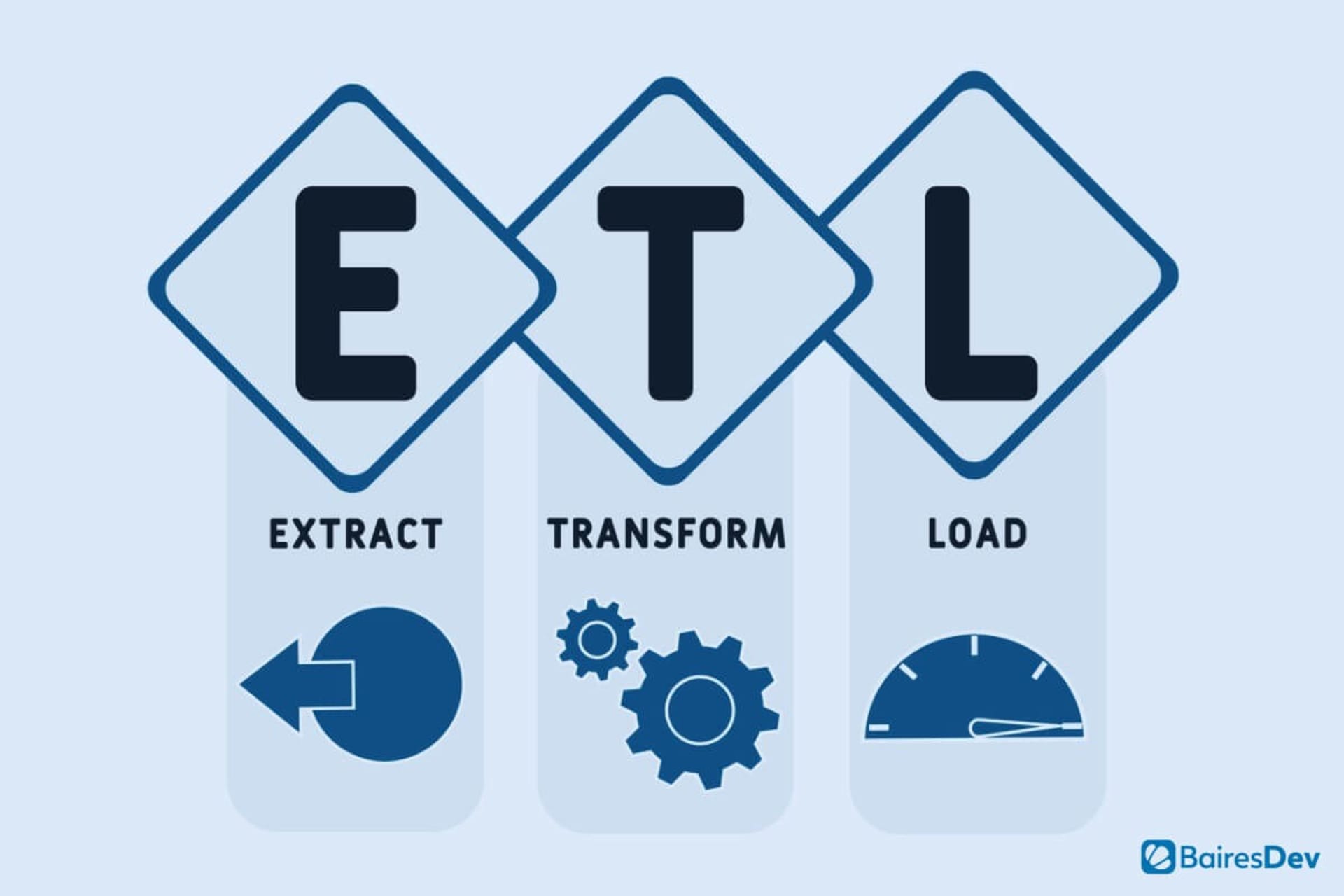ETL Development Company
Our ETL development services already power dozens of active engagements. We typically land our teams within 2 weeks, so you can start shipping top quality software, fast.
500+ companies rely on our top 1% tech talent.
ETL Development Services We Provide
ETL Data Migration
Data migrations don’t have to put your business on hold. Forget about the typical downtime headaches associated with moving critical customer, financial, and operational data. Our ETL data migration services streamline the entire process for a smooth and secure transfer of data across systems.
We use robust tools like Apache Nifi and Talend to extract data accurately, transform it according to your requirements, and load it into your target system. We also conduct thorough testing to ensure data integrity, so you don’t have to worry about losing vital information during the transition.
ETL Integration
Simplify data flow and bring clarity to even the most complex systems. Whether your data is on-premises, in the cloud, or in a hybrid setup, our team specializes in integrating various data sources into one cohesive and accessible dataset.
For real-time integration and data cleansing, we use Informatica to manage data across cloud and on-premises environments. For automating complex data transformations and loading processes, we rely on Microsoft SSIS to organize data and get it ready for analytics and decision-making.
ETL Data Analysis
Uncover trends. Predict outcomes. Make data-driven strategic decisions. Our ETL Data Analysis services go beyond simple data extraction. We turn complex, fragmented data into a unified, structured dataset that’s ready for deep analysis.
Our ETL experts use Apache Nifi for seamless data flow management, Talend for custom transformations, and Python and R for advanced statistical analysis and machine learning. We rely on SQL to query, prepare, and structure large datasets for real-time insights and strategic decisions.
Data Quality Assessment
Don’t let bad data lead to poor decisions. We meticulously evaluate your datasets for accuracy, completeness, consistency, and timeliness. So you never have to second-guess the integrity of your information.
We use advanced tools like Informatica Data Quality and Talend Data Preparation to conduct in-depth assessments, uncover hidden anomalies, and standardize data formats. Our specialists conduct comprehensive rule-based validations and anomaly detection to ensure your data is fully optimized for downstream processes, from analysis to reporting.
Custom ETL Pipeline Development
Get a bespoke data pipeline designed to handle complex needs. Whether you're integrating multiple data sources or processing high volumes of real-time data, we architect pipeline solutions that power real-time analytics, predictive modeling, and business intelligence.
Our expertise covers everything from extraction to transformation and loading. We use tools like Apache Airflow for workflow automation, Talend for intricate data transformation, and Kafka for high-throughput, real-time data streaming. Plus, every pipeline is stress-tested for performance, reliability, and data integrity.
Rolls Royce case study
Rolls Royce turned to BairesDev to develop an efficient, user-friendly mobile app. A two-week discovery process with the Rolls Royce product owner identified a comprehensive list of functionalities, data streams, and displays required to meet their clients’ expectations for a mobile SDS. Read the entire Rolls Royce case study.

Key Things to Know About ETL
Best Practices for ETL Development
Simply managing your data isn’t enough. To maximize data usability, you must optimize data accuracy, streamline integration, and enable real-time analytics. Here are some of the strategies we rely on to build a robust ETL architecture and processes that enhance decision-making, improve data quality, and drive operational efficiency.
Strategic planning is the foundation of successful ETL implementation. By starting with a thorough understanding of your business goals and data environment, we lay the groundwork for a flexible and adaptable ETL architecture.
We begin by clearly understanding your business goals and data needs. This foundation ensures that the ETL process aligns with your strategic objectives.
We design ETL architectures that can adapt to changing data sources and formats, which enables seamless integration and future scalability.
Choosing the right ETL tools is crucial. We evaluate your data environment and select tools that offer the best performance, flexibility, and ease of use.
Precision and optimization are essential during ETL development because even small inefficiencies can scale into major issues as data volumes grow. By focusing on accuracy and efficiency from the start, we deliver ETL pipelines designed for high performance and accuracy at every stage of growth.
To maintain data integrity, we enforce strict validation rules at every stage of the ETL process so that only clean, accurate data makes it to your data warehouse.
We use advanced optimization techniques, such as parallel processing and efficient query design, to ensure that your ETL processes run as efficiently as possible.
Automation is key to consistency and efficiency. We implement automation in data extraction, transformation, and loading to minimize errors and speed up processes.
Once the ETL process is developed, ongoing quality assurance and monitoring are crucial to ensure your data stays accurate, your system remains stable, and your pipeline adapts to changing business needs. Without continuous oversight, even minor issues can lead to data inconsistencies, processing delays, and system inefficiencies as your data environment grows. Our comprehensive testing and monitoring strategies keep your ETL pipelines reliable and ready for growth.
Rigorous testing is essential. We conduct exhaustive unit, integration, and performance testing to identify and resolve issues before they impact your operations.
Continuous monitoring allows us to detect and address potential issues proactively so that your ETL processes remain reliable and efficient.
As your data needs evolve, our ETL services are designed to grow with you. We plan for future scaling to handle increased data volumes and complexity.
Why Choose BairesDev for ETL Development?

Top 1% of Tech Talent
At BairesDev, we pride ourselves on hiring only the top 1% of tech talent. Our ETL developers are experts in their field, bringing technical skills, deep industry knowledge, and superior problem-solving abilities to your projects.
Custom Solutions
No two businesses are alike, and neither are their data challenges. Your data deserves more than a one-size-fits-all approach. From small-scale data migrations to complex, multi-source integrations, we provide bespoke ETL solutions that ensure your data is accurate, accessible, and ready to drive informed business decisions.
Flexible Engagement Models
Whether you need a single ETL developer or an entire team, we offer flexible engagement models that align with your project scope and budget. Plus, we have a 96% client retention rate and an average client relationship of 3+ years. So you can trust we’re committed to delivering exceptional services that keep you coming back.
Our process. Simple, seamless, streamlined.
During our first discussion, we'll delve into your business goals, budget, and timeline. This stage helps us gauge whether you’ll need a dedicated software development team or one of our other engagement models (staff augmentation or end-to-end software outsourcing).
We’ll formulate a detailed strategy that outlines our approach to backend development, aligned with your specific needs and chosen engagement model. Get a team of top 1% specialists working for you.
With the strategy in place and the team assembled, we'll commence work. As we navigate through the development phase, we commit to regularly updating you on the progress, keeping a close eye on vital metrics to ensure transparency and alignment with your goals.
Frequently Asked Questions
Which industries benefit the most from ETL development services?
Industries that are data-rich and require detailed analysis and reporting will benefit the most from ETL. Finance, healthcare, retail, and logistics are a few examples.
- Finance: Financial institutions use ETL to consolidate transaction data, customer information, and market data from multiple sources. This allows them to create reports, detect fraud, and meet regulatory requirements.
- Healthcare: In healthcare ETL is used to merge patient records, clinical trial data and operational data. This unified view helps with better patient care, research and compliance with industry regulations.
- Retail: Retailers use ETL to analyze sales data, customer behavior and inventory levels. By integrating data from online and offline channels they can optimize pricing, improve customer experience and forecast demand more accurately.
- Logistics: Logistics use ETL to manage data from multiple sources such as supply chain systems, GPS tracking and inventory management tools. This allows companies to optimize routes, reduce costs and improve delivery times.
How long does it take to implement an ETL solution?
The time it takes to implement an ETL solution varies depending on the complexity of the project, the amount of data integration and the business requirements. A small ETL project can take a few weeks, a larger implementation can take several months.
What are the challenges in ETL development?
ETL development has its own set of challenges especially when dealing with complex data environments. Some of the common challenges are:
- Data Volume Management: Managing large volumes of data integration can strain ETL pipelines and cause performance issues and bottlenecks. Effective ETL development requires scalable infrastructure and processes to manage data efficiently.
- Data Quality: Data integration quality is key in ETL. It is essential to ensure the data is clean, consistent and accurate before loading into the target system. This often involves implementing robust data validation and cleansing mechanisms.
- Integrating Disparate Data Sources: ETL often involves pulling data from multiple sources each with its own format and structure. Integrating these disparate data sources into a unified format requires careful planning and expertise to avoid data loss or corruption.
- ETL Performance: As data grows and transformation processes become more complex, ETL performance can become a challenge. This requires ongoing monitoring and tuning to ensure the ETL pipeline remain efficient and meets the business requirements.
Can BairesDev handle ETL projects with legacy systems?
Yes, we have experience working with legacy systems. We design ETL processes that integrate data from older systems so your business can use valuable historical data while adopting modern technology.
How Businesses Can Overcome the Software Development Shortage
BairesDev Ranked as one of the Fastest-Growing Companies in the US by Inc. 5000

See how we can help.Schedule a Call










